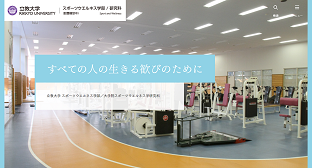Graduate School of Sport and Wellness
Niiza Campus
OBJECTIVE.
Graduate school open in nature
Pursuing human potential and realizing a comfortable and energetic wellness society
Features
Graduate School of Sport and Wellness
Enhancing the wellness of all people, including athletes, and building a wellness society
The graduate school defines sport and wellness studies as the fusion of sports science, which enhances sports performance and nurtures a sophisticated sport culture, and wellness science, which helps people maintain and promote mental and physical health so that they can lead happy and fulfilling lives. Consequently, the graduate school offers education and conducts research involving comprehensive studies of sport and wellness. Its most distinctive feature is the ability to create new knowledge based on acquired concepts of sports science and wellness science. It aims to create new knowledge from basic and applied research, as well as practical applications in sport and wellness studies, an interdisciplinary field that combines natural and social sciences.
Japan is entering an era of a super-aging society. How to address issues such as the enhancement of people’s wellness (the concept of comprehensive health) is an increasingly important national challenge. Ways to address this include making individuals’ lives meaningful through sport, and preventing them from becoming socially isolated by building fulfilling relationships with other people and nature. To that end, it is necessary to build a society where people are encouraged to enhance their wellness in order to be balanced mentally and physically, and where people have healthy relationships with each other and nature. It is also necessary to have academic knowledge about sport and wellness to achieve outstanding performances in competitive sports. Conversely, methods to achieve such outstanding performances can be used to improve wellness.
In order to develop versatile candidates, students take classes in both the sport and wellness fields in the master’s program, regardless of their post-graduation career path. In the doctoral program, the curriculum requires students to choose a sub-supervisor from each of the two fields, in addition to their main supervisor.
The graduate school defines sport and wellness studies as the fusion of sports science, which enhances sports performance and nurtures a sophisticated sport culture, and wellness science, which helps people maintain and promote mental and physical health so that they can lead happy and fulfilling lives. Consequently, the graduate school offers education and conducts research involving comprehensive studies of sport and wellness. Its most distinctive feature is the ability to create new knowledge based on acquired concepts of sports science and wellness science. It aims to create new knowledge from basic and applied research, as well as practical applications in sport and wellness studies, an interdisciplinary field that combines natural and social sciences.
Japan is entering an era of a super-aging society. How to address issues such as the enhancement of people’s wellness (the concept of comprehensive health) is an increasingly important national challenge. Ways to address this include making individuals’ lives meaningful through sport, and preventing them from becoming socially isolated by building fulfilling relationships with other people and nature. To that end, it is necessary to build a society where people are encouraged to enhance their wellness in order to be balanced mentally and physically, and where people have healthy relationships with each other and nature. It is also necessary to have academic knowledge about sport and wellness to achieve outstanding performances in competitive sports. Conversely, methods to achieve such outstanding performances can be used to improve wellness.
In order to develop versatile candidates, students take classes in both the sport and wellness fields in the master’s program, regardless of their post-graduation career path. In the doctoral program, the curriculum requires students to choose a sub-supervisor from each of the two fields, in addition to their main supervisor.
Programs
-
Graduate Program in Sport and Wellness
Establishing a system to accept a wide range of students on the principle of “for everyone’s joy of living”
The program accepts a wide range of students: not only those who have majored in sport and wellness at the undergraduate level, but also those who have majored in other fields, those who have already worked in this field, or anyone who wants to contribute to everyone’s joy of living.Overview
Fusion of sports science and wellness science
The curriculum focuses on fostering perspectives that fuse sports science, which enhances sports performance and nurtures a sophisticated sports culture, and wellness science, which helps people maintain and promote mental and physical health so that they can lead happy and fulfilling lives.
Aiming to develop three type of human resources with the dual perspective of sport and wellness studies
In terms of post-graduate career paths, the program envisions three types of human resources capable of taking leadership in the sport and wellness field and actively contributing to the realization of a wellness society in which everyone can lead a comfortable and energetic life:
•those who can help athletes achieve outstanding performance (athlete performance)
•those who can help enhance people’s overall wellness by encouraging more involvement in sport (wellness and sport)
•those who can help to educate people based on their understanding of a healthy relationship between nature, living environments and sport.Feature
Active exchange with domestic and international research institutions
The graduate school conducts joint research with domestic institutions such as Tokyo Medical and Dental University and the Japan Sport Council, and overseas universities such as Edith Cowan University of Australia. This gives students an opportunity to mingle and exchange information beyond the confines of the school so that they can expand their personal and academic networks, which are crucial for research and practice. The graduate school, in particular, holds a workshop titled “Research communication skills for world-class exercise and sports science” with Edith Cowan University. This system of conducting joint research enables students to conduct dialogue with other graduate school students who belong to different universities at home and abroad; be exposed to different perspectives; and attain various other goals. Moreover, there are laboratory facilities for each research field. A new building accommodating all the research and laboratory facilities was completed in April 2025 at the Niiza Campus.
A wide range of research support provided to graduate students
Rikkyo University provides support for graduate students’ research through its Special Fund for Research and has a system to encourage participation in academic conferences. In addition, the Graduate School of Sport and Wellness is scheduled to open a research center and create a fund to promote academic research. The graduate school plans use the fund to create a system of its own to provide a subsidy to finance graduate students’ individual research projects, or joint research projects conducted by multiple graduate students (one of whom will serve as the lead researcher). The system plans to fund 10 to 20 research projects a year. The graduate school is also considering a system to encourage students to attend international conferences to make presentations on the results of their research.
Learn more
For more information, please visit the links below.

